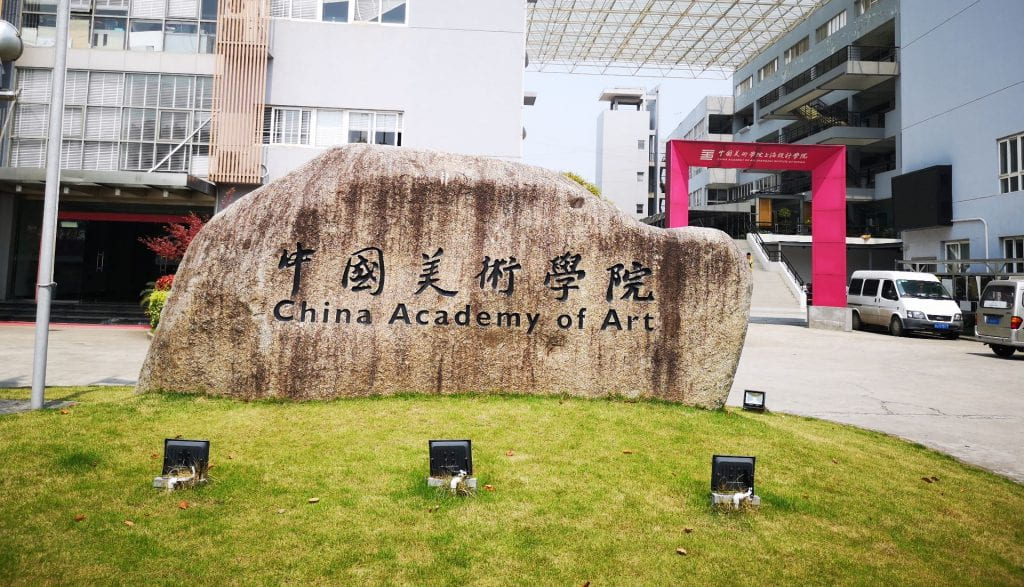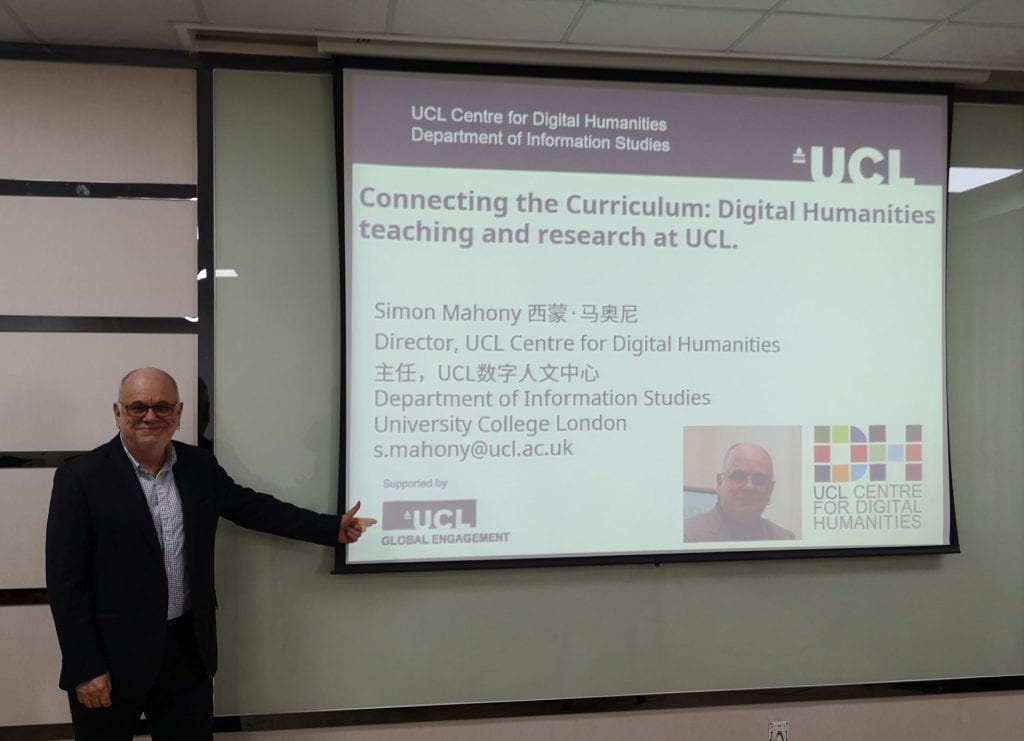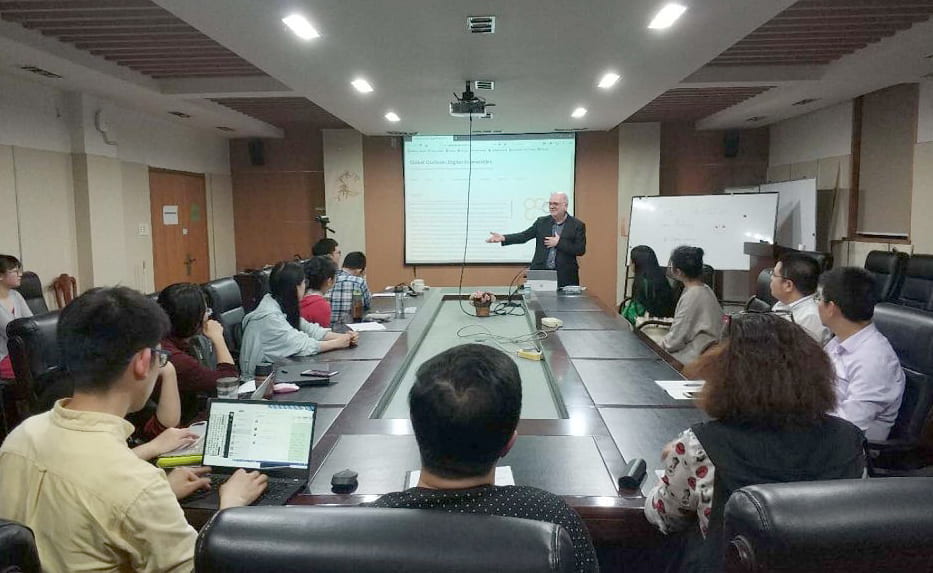Digital Humanities China, Spring networking
By Simon Mahony, on 21 May 2019
The long Easter break once again enabled the opportunity for travel, supported by the UCL Global Engagement fund, to build on and extend our UCLDH China networks. Flying to Shanghai always means a visit to CAA, Shanghai Institute of Design and to see what is new there.
My first major speaking event was at the University of Wuhan, missing the flower festival but also the crowds, to deliver talks to undergraduate and postgraduate students at their Digital Humanities centre (the first in mainland China), based in their School of Information Management, a member of the iSchools Consortium. The topics requested were combining research and teaching in our Connected Curriculum and cultural influences on digital design.
Traveling back to Shanghai enabled a visit to the outstanding DH research team at the Shanghai Library, which is both a public and research library. They are part of the Institute of Scientific & Technical Information of Shanghai and so combine the functions and expertise of the library, special collections, and research institute. They have a broad range of research interests and are always open to new possibilities and opportunities to hear about our UCLDH research projects.
Networking is about building on established relationships, but it is also about making new ones. One such new contact at this trip was made when I was invited to visit and speak at the University of Zhejiang, Hangzhou (which happens to be in my favourite Chinese city). They have a small but active DH group based in the School of Humanities and are attempting to develop a DH pathway for doctoral students. I was given a tour of their special collections, introduced to examples of Chinese book binding, and their tranquil rooftop Research Centre for Buddhist and Daoist Culture. As this was my first visit, I gave an overview of DH research and teaching and how that fits into a wider and more global context.
Being at Hangzhou, I took the opportunity for a short train journey (not so short in UK terms but certainly quick on the high-speed rail) and a first visit to the University of Nottingham Ningbo China. We have had many students from UNNC on the MA/MSc DH programme; the meeting and lecture was arranged up by an alumna returning there after graduation to work at her UG and hometown institution. The campus is relatively small, very compact and very green with buildings mirroring their UK namesake. A research paper delivered this time on all things open: Open Access, Open Publishing, and Open Data. In our area of interest, they have a well-resourced and equipped Technology Centre with a Mixed Reality (Visualisation and AI) Lab with impressive tech projects in development.
Final stop for this trip was the University of Nanjing to take part in their seminar ‘Rethinking Digital Humanities Through Comparative Insights’, with a range of speakers from several institutions in China, the USA and me from the UK.
Networking, building connections and creating partnerships are important aspects of our work. Digital Humanities is a fast-growing and vibrant field in mainland China and I am very pleased to have been supported by the UCL Global Engagement fund which has allowed me to build up these networks. Chinese institutions are always very welcoming, great hosts and often have funds to support visitors. What is difficult for them is paying money outside the country for things like air flights. The GEO funding I have received has covered my air fare but also importantly has allowed me to employ Chinese graduate students to add translations to my presentation slides (you can see examples above) and lecture materials to develop some of them into bilingual teaching materials that are released as Open Educational Resources (OERs) on the new UCL OER Repository that supports agendas such as the Connected Curriculum and Open Science.
I have more trips coming up over the Summer months and look forward to further developing these networks.
Digitising monument records and archaeological archives – the Central Asian Archaeological Landscapes (CAAL) project
By Lucy Stagg, on 29 April 2019
UCLDH members Tim Williams and Gai Jorayev were among staff from the Institute of Archaeology who have received a £2.89m grant from Arcadia – a charitable fund of Lisbet Rausing and Peter Baldwin – for the Central Asian Archaeological Landscapes (CAAL) project.
This involves working with partners across the region – the Republic of Kazakhstan, Kyrgyz Republic, Republic of Tajikistan, Turkmenistan, Republic of Uzbekistan, and the People’s Republic of China (Xinjiang Uyghur Autonomous Region) – to digitise monument records and archaeological archives, to create an online digital inventory, adopting the open-source ARCHES inventory package developed by the Getty Conservation Institute and the World Monuments Fund.
This will be enhanced by new research using a combination of high resolution photographic and satellite imagery, along with ‘on the ground’ field visits, in order to discover new sites, improve documentation, promote awareness and scholarship, and facilitate policy-making to better enable site and landscape preservation. See https://www.ucl.ac.uk/archaeology/research/CAAL/for more details.
Corpus analysis reveals ‘Routine politeness in American and British English requests’
By Lucy Stagg, on 23 April 2019
UCLDH team member, Dr. Rachele De Felice, has had an article published in the Journal of Politeness Research.
Co-authored with M. Lynne Murphy, the article is entitled Routine politeness in American and British English requests: use and non-use of please (Journal of Politeness Research 15(1), 77-100). The article extract explains further:
This paper looks at the use and non-use of please in American and British English requests. The analysis is based on request data from two comparable workplace email corpora, which have been pragmatically annotated to enable retrieval of all request speech acts regardless of formulation. 675 requests are extracted from each of the two corpora; the behaviour of please is analyzed with regard to factors such as imposition level, sentence mood, and modal verb type.
Rachele’s research is in the field of corpus pragmatics. It focuses on speech act annotation and the creation of pragmatic profiles of Business English by applying corpus analysis and natural language processing (NLP) techniques to large collections of real-world data.
Reflections on ‘Big Data in Archaeology’
By Lucy Stagg, on 15 April 2019
UCLDH team member Andreas Vlachidis gave a talk at the Big Data in Archaeology: Practicalities and Possibilities conference (27-28th March 2019), organised by the McDonald Institute for Archaeological Research, University of Cambridge.
Andreas’ talk was entitled “Reflections on excavating archaeological grey literature: and on the challenges in information extraction”
The conference website explains the aim of the conference:
This conference will bring together leaders in the fields of archaeological data science to critically evaluate the concepts and methods associated with “big data” and data-intensive research approaches. The goal of this conference is to provide a forum for discussion about the growing complexity of archaeological data as well as to provide participants with the scaffolding to explore their own application of data science methods.
For more see https://erikgjesfjeld.wixsite.com/big-data-archaeology
Ethics and Digital History IHR presentation
By Lucy Stagg, on 26 February 2019
UCLDH deputy director Julianne Nyhan gave a presentation at the Institute of Historical Research Digital History Seminar on Ethics and Digital History.
Dr Nyhan drew on her oral history research to reflect on the ethical aspects of using oral history methodologies to research the ‘hidden’ histories of Digital Humanities. Among other questions she asked: who ‘owns’ oral history interviews and transcripts? What are the implications of being an ‘insider’ of the (academic) community one is seeking to research? What about the ethical issues that can occur ‘downstream’ of oral history research, for example, the use of contingent labour to provide research assistance and interview transcription?
Also on the panel were: Sharon Webb (University of Sussex); Kelly Foster (public historian); Kathryn Eccles (Oxford Internet Institute)
You can watch a recording of the panel on Youtube
Recent publications on imaging techniques from UCLDH team member Dr Kathryn Piquette
By Lucy Stagg, on 4 February 2019
UCLDH team member Dr Kathryn Piquette has had several works published recently, including:
- An article in CIPEG’s e-newsletter from October 2018: Investigating the Manufacture of Late 4th Millennium Decorated Palettes, in which Kathryn discusses Reflectance Transformation Imaging as a technique whose level of detail enables systematic assessment of carving techniques, tool use, skill, aesthetic principles, and artistic priorities.
- A book chapter: Piquette, K. E., 2018. Revealing the Material World of Ancient Writing: Digital Techniques and Theoretical Considerations. In: Hoogendijk, F.J. and van Gompel, S. (eds), The Materiality of Texts from Ancient Egypt. Leiden, Netherlands: Brill.
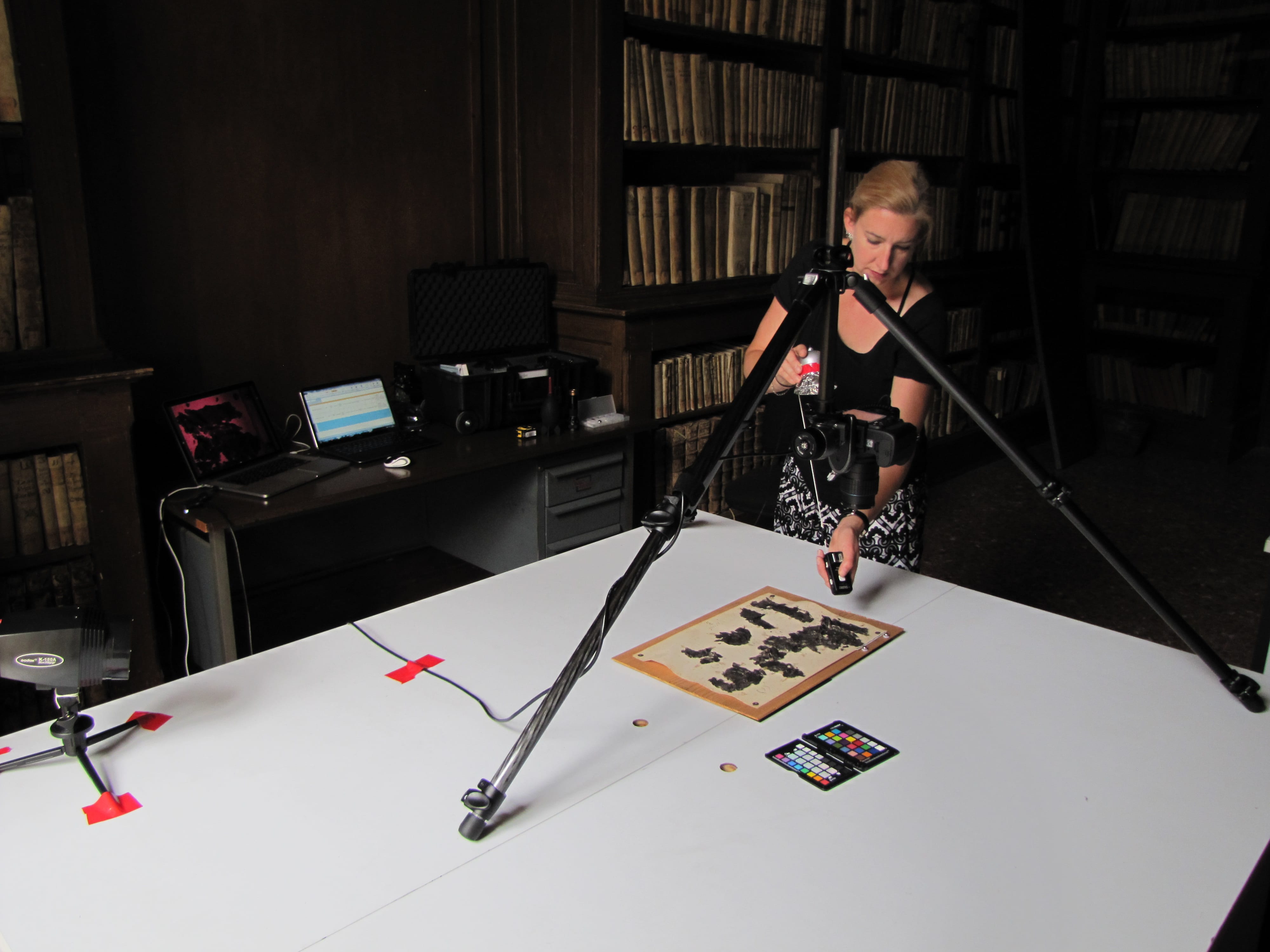
Dr. Kathryn Piquette undertaking Reflectance Transformation Imaging (RTI)
CAFA EAST: Education, Art, Science and Technology
By Simon Mahony, on 8 December 2018
I was reminded recently of my Classics background and about the link between art and technology, how new technological advances would push forward the development of, particularly, the plastic arts. The same is true now and I was delighted to be invited to speak at CAFA, the Central Academy of Fine Arts, Beijing, at their International Conference on Education, Art, Science and Technology.
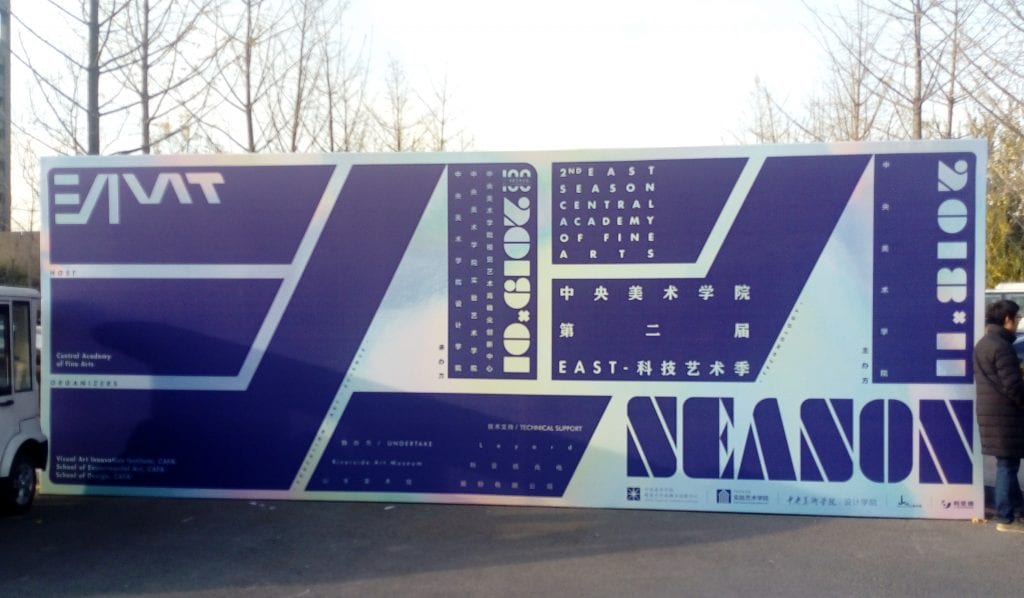
CAFA EAST: Education, Art, Science and Technology
My keynote talk, ‘Digital Humanities teaching and Research at UCL: connecting the curriculum’, was part of their Global Landscape session and followed by a panel on engaging pedagogy with art-based research. This was their 2nd EAST Season with a long-term objective to create a global alliance of art and technology institutions, research and education centres to spread and exchange ideas. The conference brought together practitioners and researchers, technologists and educators, design and gallery professionals. Live translation made the talks accessible to all.
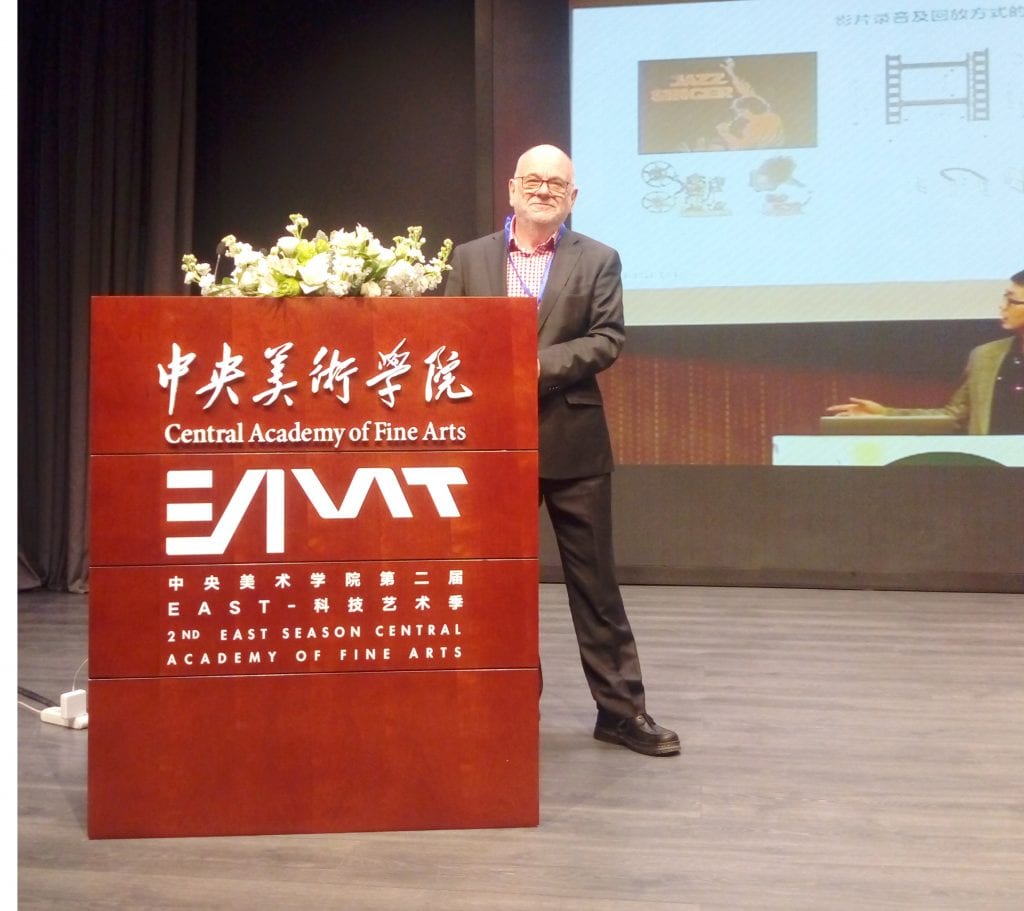
On the stage at CAFA
CAFA is currently celebrating its 100th anniversary.
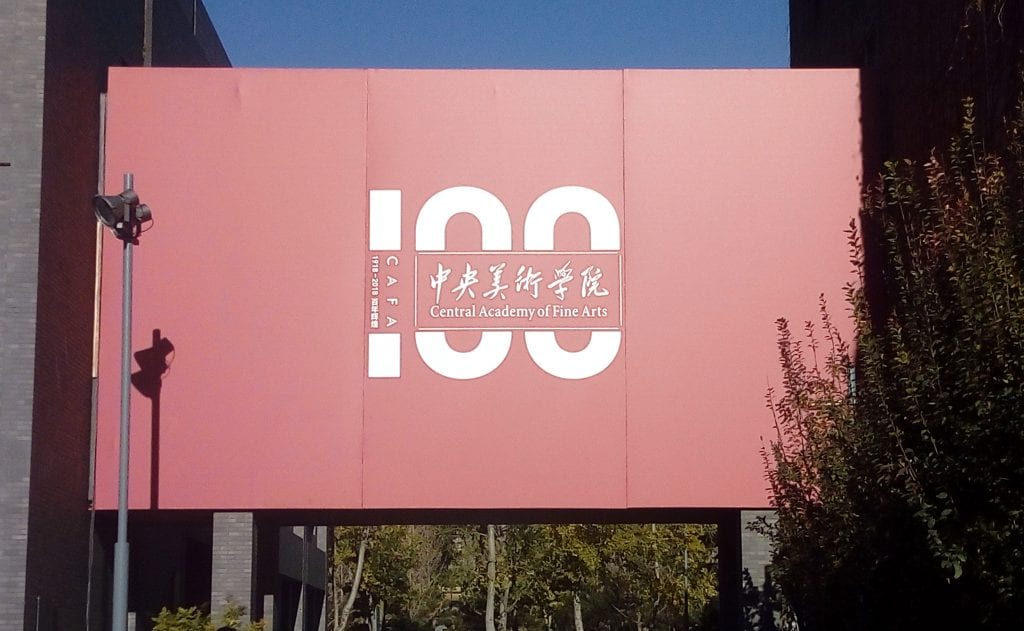
CAFA: 100 years
I was also asked to run a workshop to introduce an understanding of some aspect of digital humanities. I chose, what is to my mind, one of our distinguishing features and that is our cross-disciplinary nature and the importance of collaborative working. My aim was to introduce the concept of collaborative writing with a practical to develop skills needed for multi-authored documents.

Collaborative writing workshop
So, a talk on the importance of group work followed by a writing-sprint; in small groups they were tasked to write a short piece with a choice of either a short story or something about their experience of the conference. All the groups chose the short story option and managed an impressive output which they presented, as groups, after 90 minutes. The participants had wide ranging backgrounds and were almost all staff and professionals. The stories revolved around a fascination with AI, robotics and gender, fantasy and dreams. Google docs (which I would normally use) is, of course blocked in China and they introduced me to their equivalent: Shimo. I learn new things and make new contacts at every trip.
Museum Hackathon: digging into museum data sets.
By Simon Mahony, on 1 December 2018
UCLDH hosted its second hackathon focusing this time on visualising museum data sets. This was organised in partnership with the Media Centre and the Chair of Didactics of Computer Sciences of the TU Dresden. See also their news post.
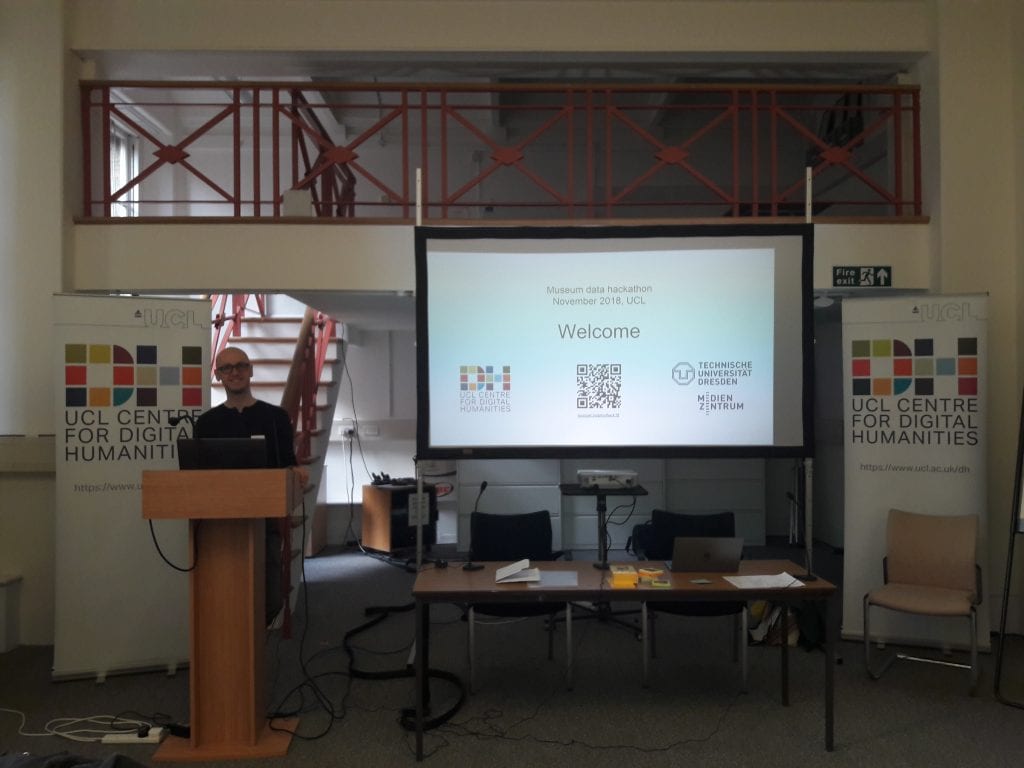
Introduction at the Museums Hackathon
The attendance was disappointing low – we must have clashed with other events – but with great expert technical support from Owain Kenway (RITS) and Uli Tiedau (SELCS).

Experts supporting the hackathon participants
The prize-winning participants, students from the Digital Humanities programme and from TU Dresden, produced a really interesting collaborative project: UrbanHitory3D combining AR with historical images of Dresden.

Hackathon prize winners
Many thanks to all those who helped to organise the event and to support the students with their project development. Thanks also to Dresden 2025 for their generous sponsoring of the prize being awarded in the photo.
Riding the Mail Rail 2018
By Simon Mahony, on 1 November 2018
One of the nice things about having working partnerships with other institutions is that you get invited to their events. When the invitation is from the Postal Museum for a Mail Rail event you get to explore their underground museum, enjoy their hospitality but even more importantly, you get to ride on the underground Mail Train (now converted to take passengers rather than mail sacks).
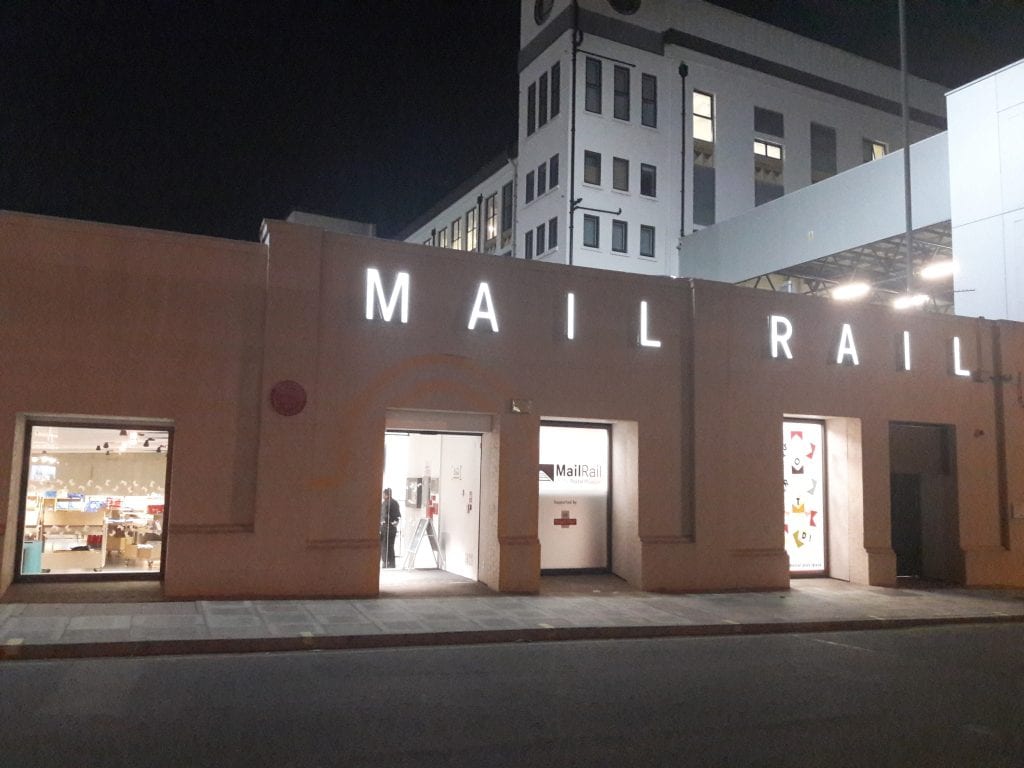
Mail Rail at the Postal Museum
These are the tunnels under London where the mail from the Mount Pleasant sorting office (in the background of the image) that was destined for London would be sorted and distributed by a network of underground tunnels.

Mail Rail sorting office
With a colleague from UCLDH, we met with their CEO and researchers, enjoyed their hospitality, discussed possible collaborations while eagerly awaiting our turn on the train.

Travelling Post Office
The network was, of course, built to carry mail sacks and so the carriages are necessarily small to fit in the narrow tunnels, so this no place for the claustrophobic.
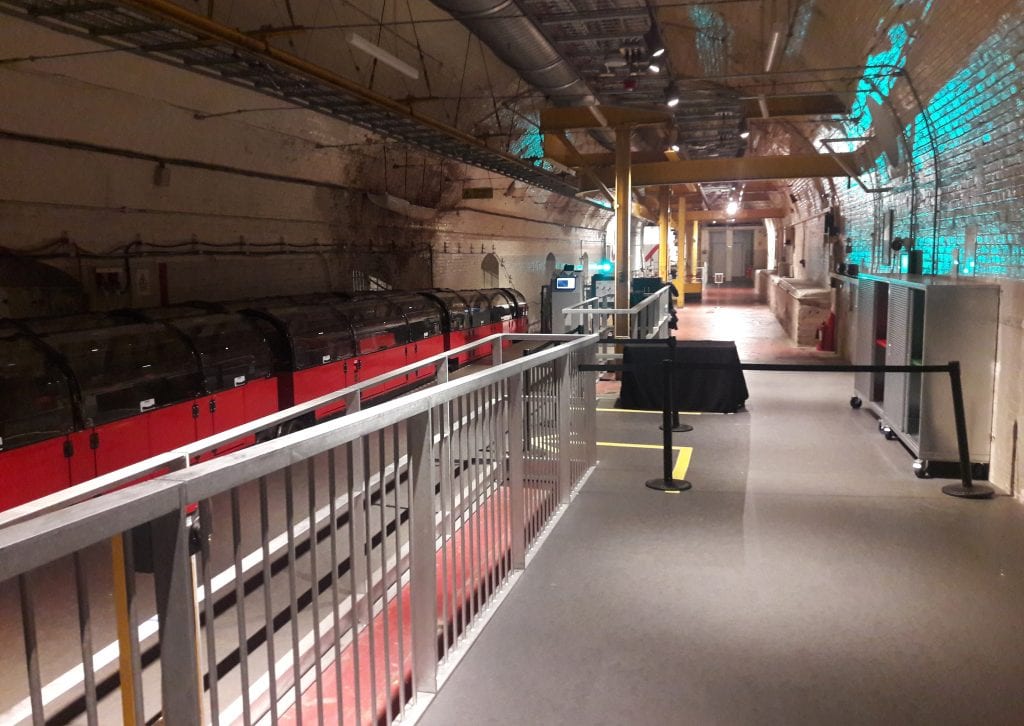
Mail Rail mini-train
We have had students at the Postal Museum for several years now and riding the mail train has always been identified in their reports and one of the highlights. And all just a short walk from UCL.
Shanghai Library Forum (SILF 2018)
By Simon Mahony, on 1 November 2018
I was very pleased to be invited back to the Shanghai Library and this time to speak in the Digital Humanities strand of the 9th Shanghai International Library Forum (SILF 2018). The municipal library of Shanghai is the second largest public/research library in China (after the National Library in Beijing) and also houses the Shanghai Institute of Scientific and Technical Information.

Shanghai Library
The building is certainly impressive and a fitting venue for an extremely wide-ranging conference. I felt privileged to be included among the VIP foreign speakers.

9th Shanghai International Library Forum (SILF 2018)
The theme for the conference was ‘Library for All: Towards a Smarter and Inclusive Society’ with eight sub-themes including ‘smart age and smart libraries’, ‘the transformation and innovation of libraries in the age of the “internet+”‘, ‘design ideas in libraries’ and more. My session, ‘digital humanities and library services’ allowed me to talk about and highlight some of the important initiatives taking place in the West: Open Access, Open Publishing and Open Science.

Simon presenting at SILF 2018
And that context gave a welcome opportunity to once again showcase UCL Press with its strong stand on open and the recent celebration of 1 million downloads.
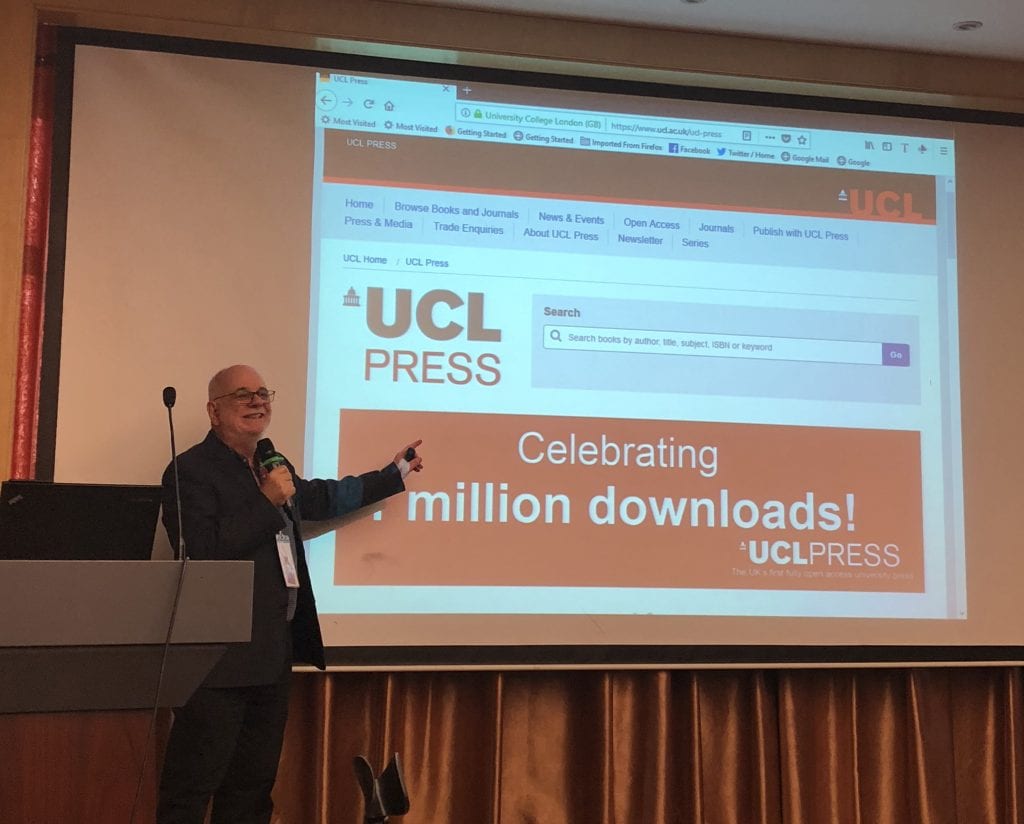
UCL Press 1 Million downloads
It was particularly pleasing to be able to be joined at the conference by two DIS students: Yamin Fu, who gave an excellent paper, taken from her PhD research, titled ‘Cognitive mapping in exploring library user experiences’, and a completing MSc Information Studies student, Yifan Wang. My thanks to them both for the photos of me above and for making sure that I didn’t get lost (too often).
As always, the hospitality was exemplary with a VIP welcome dinner plus a conference banquet featuring the many multi-talented library professionals demonstrating skills ranging from calligraphy, a traditional tea ceremony, modern and traditional dancing (not all at the same time). The conference was rounded off with a visit to the original Shanghai Library in Yangpu, which has recently been opened to the public after considerable restoration. Do take a look at the images on the website link.
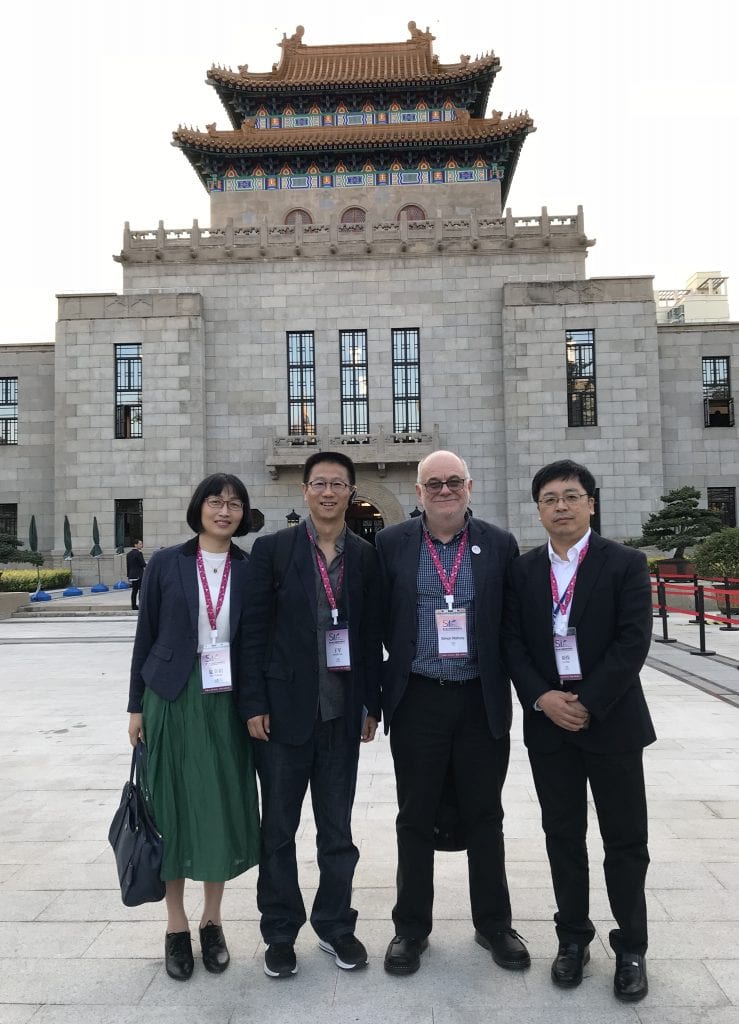
Simon with friends from SHL and PKU at the Yangpu Library
The Digital Humanities research team at the Shanghai Library are involved in an impressive array of research projects with much of their output and many data sets freely and openly available. They produced a document flyer for the conference: From Digital Library to Digital Humanities – The Practice of Shanghai Library and I include images of that here.
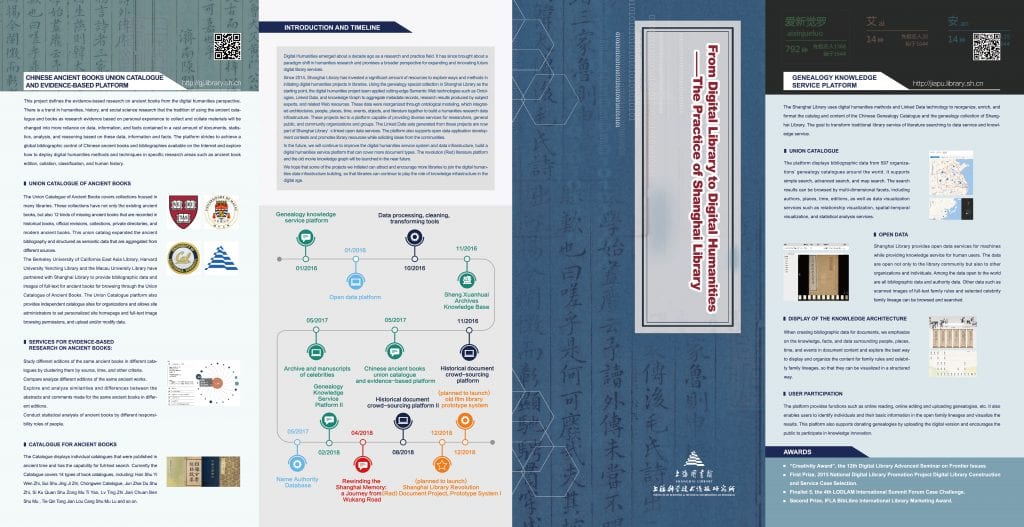
From Digital Library to Digital Humanities – The Practice of Shanghai Library (cover)

From Digital Library to Digital Humanities – The Practice of Shanghai Library (inside)
 Close
Close


